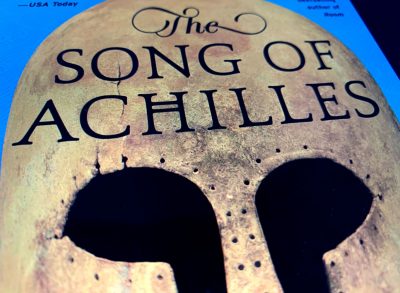This past week, I read “The Song of Achilles” by Madeline Miller, and I have a lot to say.
The novel is a fictitious retelling of the classic Greek myth of Achilles and his companion and rumored lover, Patroclus. Miller tells the story of their love through the eyes of Patroclus, spanning from childhood to adulthood in a lyrical writing style. The raw depiction of love and passion, coupled with natural but complex character development, makes for a gripping read.
Many would classify this novel as typical LGBTQ+ literature because after all, the two main characters are in a same-sex relationship. But having read my fair share of LGBTQ+ romance, I picked up on a pivotal difference between this novel and so many others I have consumed, and it helped me realize that there is a serious issue within the genre.
I am a strong advocate for raising awareness about the community through literature, but I’ve come to realize there is a right way to do it and a wrong way. My grievance isn’t with the stories classified in this way, but more so in the classification and label itself. Much of the contemporary LGBTQ+ literature we are exposed to today makes being gay the only thing the book is about.
Take the book-turned-movie “Love, Simon.” It revolves around how Simon is forced out of the closet and how he deals with the fallout of that as he explores a relationship with a mystery boy online.
The story is painfully one-dimensional. Its only notable plot point is Simon’s sexuality to the point where it feels like the overly-politicized nature of the plot is doing the LGBTQ+ community a painful injustice.

Like in this story, it seems like authors often focus so much on the same-sex nature of the relationship that it no longer feels like a relationship at all, with a lack of emotional development or true exploration of the characters’ connection.
Miller’s story is nothing like that at all. One of the ways she brilliantly achieves this is through the interweaving of an ancient tale with a romance often overlooked. Gay people didn’t just happen to show up in the past 100 years. The LGBTQ+ community has always existed throughout history, with literature failing to acknowledge their existence.
But Miller rebuilds a tale as old as time with a love story at the core, making it feel no different from any other love story as she weaves their love into history.
Similarly, Achilles and Patroclus’s love story largely exists in secret, just focusing on them and not the surrounding society, which allows the author to delve into the true raw beauty of their connection, one unlike any romance I have ever read.
The story begins with Patroclus experiencing feelings of attraction toward his friend Achilles, though unable to recognize them for what they were. He marvels at Achilles’ beauty and grace. The line between friendship and romance is quickly crossed and the two explore their connection in the seclusion of the forest, unveiling a lifelong bond without outside influences and judgment.
Having grown up together, their souls become intertwined. Miller gracefully depicts the way two people can love so strongly that they nearly mesh into one being, making you feel that they were always just two halves of a whole. But she still maintains their individuality — Achilles is a strong demi-god on a quest for fame and Patroclus is a gentle and kind healer. They love each other for their differences, having been together through every hardship of their young lives.
It is important to note that the love story isn’t the only thing happening in “The Song of Achilles.” The characters grapple with war, fame, immortality and the loss of humanity. It serves as a great example of LGBTQ+ representation in that it approaches and treats gay romance the same way straight romance would be written about. There is so much more besides their sexuality that makes this book great.
All this being said, there is still a scary amount of stigma surrounding the LGBTQ+ community. As a person who has been influenced by literature more than anything else in their life, I believe words can help spread the awareness the community deserves. But words are powerful, and must be used carefully and correctly.
All in all, I’m inclined to believe that this book will become a modern classic, and so I urge you to give it a try, no matter who you are. It might surprise you.

















































































































